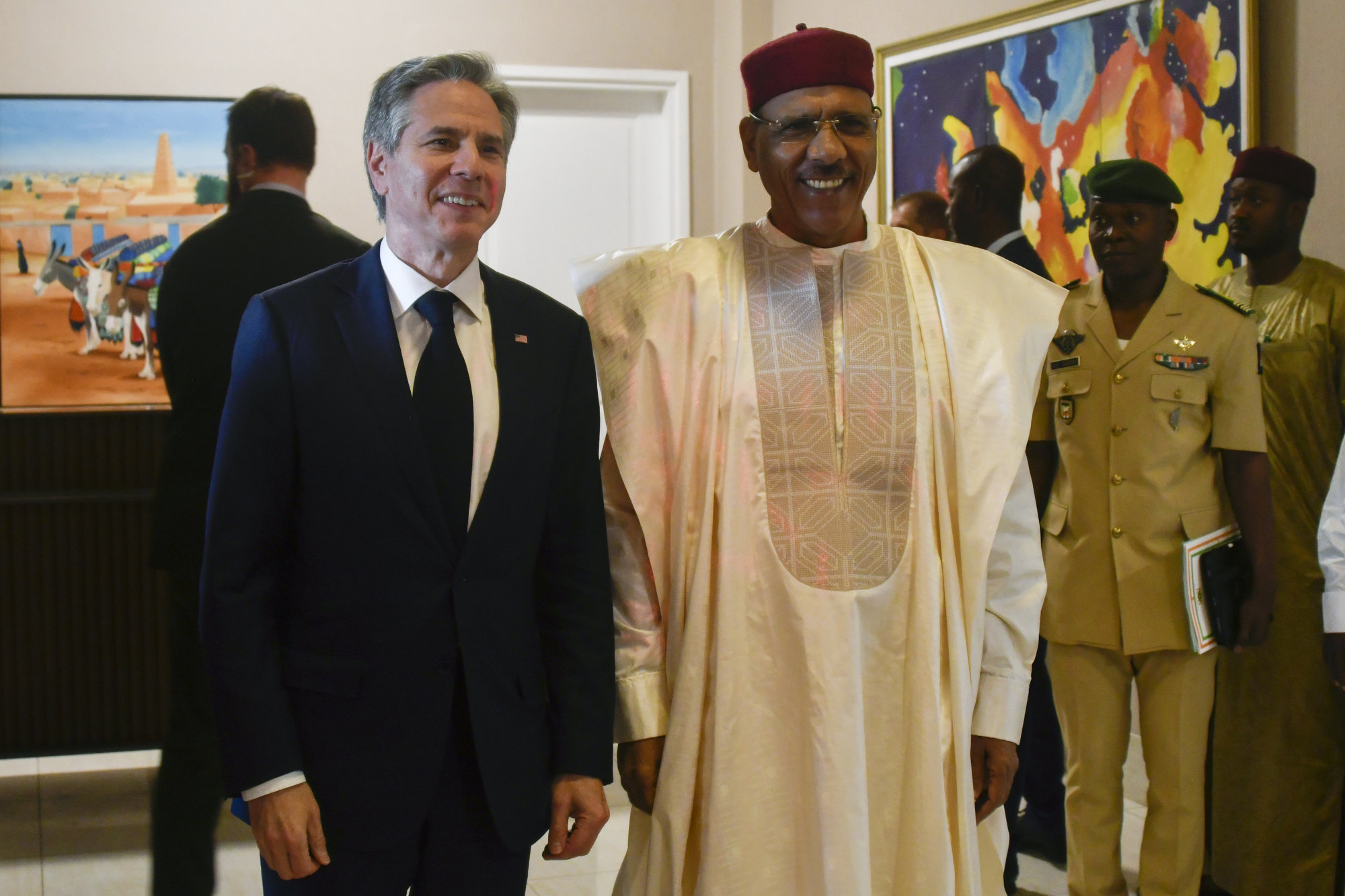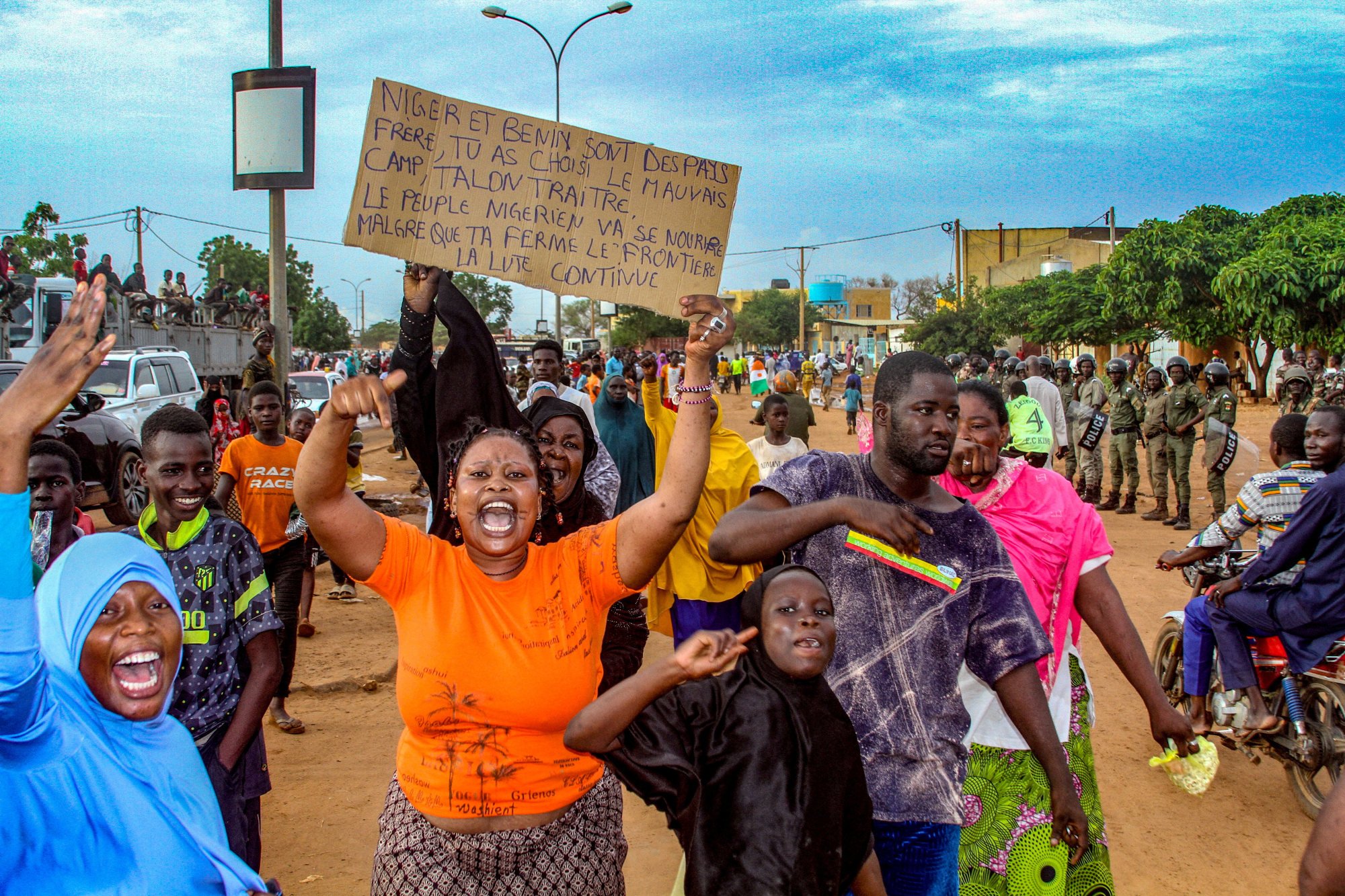
Coup leaders ‘will prosecute Niger’s deposed President Mohamed Bazoum for high treason’
- The announcement came hours after the mutinous officers said they were open to dialogue with West African nations to resolve the regional crisis
- If convicted, Mohamed Bazoum – who is accused of undermining state security – could face the death penalty, according to Niger’s penal code
The military junta that seized power in Niger said it plans to prosecute deposed President Mohamed Bazoum for “high treason” and undermining state security, an announcement that came hours after the mutinous officers said they were open to dialogue with West African nations to resolve the regional crisis.
If convicted, Bazoum could face the death penalty, according to Niger’s penal code.
A spokesman for the junta, Colonel Major Amadou Abdramane, said on state television that the military regime had “gathered the necessary evidence to prosecute before competent national and international authorities the ousted president and his local and foreign accomplices.”

The Sunday night announcement said Bazoum was being charged following his post-coup exchanges with high-ranking West African politicians and “their international mentors”, whom the leaders of the revolt accuse of making false allegations and attempting to derail a peaceful transition to justify a military intervention.
The statement did not identify specific foreign nations and did not specify a date for the trial of Niger’s democratically elected president.
Still, on the streets of the capital on Monday, some residents told Associated Press they believed Bazoum was guilty. “Crimes for high treason is really what he deserves because this man betrayed Niger by stealing all of Niger’s resources,” Niamey resident Assan Zakite said.
“We are incredibly dismayed by reports that President Bazoum’s unjust detention has gone even a step further,” State Department spokesman Vedant Patel told reporters.
“This action is completely unwarranted and unjustified and, candidly, it will not contribute to a peaceful resolution of this crisis.”
US Secretary of State Antony Blinken, who visited Niger in March in the highest-level visit ever by a US official, spoke on Monday by telephone to President Bola Tinubu of regional heavyweight Nigeria.

Blinken commended Tinubu’s efforts leading Ecowas and backed “maintaining pressure” on Niger’s military leaders.
Members of the presidential guard ousted Bazoum on July 26. He has since been under house arrest with his wife and son in the presidential compound in the capital, Niamey.
The junta has faced international pressure to release and reinstate Bazoum. Immediately after the coup, the Economic Community of West African States (Ecowas) gave the regime seven days to return him to power and threatened to use military force if that did not happen. The deadline came and went with no action from either side.
Niger junta says France planning strikes to free Bazoum, Chad tries to mediate
Last week, Ecowas ordered the deployment of a “standby” force, but it is unclear when or if it would enter Niger.
The African Union Peace and Security Council was meeting on Monday to discuss the crisis and could overrule the West African bloc’s decision if it thought an intervention threatened wider peace and security on the continent.
People close to the president and in his political party reported last week that the first family’s electricity and water were cut off and they are running out of food.
The junta dismissed the reports and on Sunday accused West African politicians and international organisations of waging a disinformation campaign to discredit the junta.

Rights groups worry Bazoum will not get a fair trial because the junta’s newly appointed justice minister is the former president of the country’s military tribunal.
“We don’t trust him. He can’t embody ideal independence and free justice,” Ali Idrissa, executive secretary of a local human rights group, the Network of Organizations for Transparency and Analysis of Budgets.
The junta named a 21-person Cabinet last week that includes both civilians and military officers, but the uncertainty and mixed messages from the people claiming to run Niger continued.
Before the military accused Bazoum of treason, a member of the junta’s communication team told journalists on Sunday evening that the regime had approved talks with Ecowas that would take place in the coming days.
A mediation team of Islamic scholars from neighbouring Nigeria that had met the junta over the weekend also said the regime was open to dialogue with Ecowas.
Detained Niger president defiant after coup bid by mutinous soldiers
Previous attempts by Ecowas to speak with the junta foundered as its delegations were barred from entering the country.
The military regime’s stated openness to talks could reflect the toll of severe economic and travel sanctions West African leaders imposed after Bazoum’s ousting but does not mean the discussions will go anywhere, according to Sahel experts.
“Let’s see what these negotiations actually look like, because it’s also in the junta’s benefit to, in the least, entertain talks,” said Aneliese Bernard, a former US State Department official who specialised in African affairs and is now director of Strategic Stabilization Advisors, a risk advisory group.
“That doesn’t mean they’ll be serious about them.”
Talk of a potential military mobilisation outside Niger also continues.

In an August 11 memo seen by Associated Press, Senegal’s security forces ordered a “regroupment” from bases in Senegal for Monday as part of the country’s contribution to the Ecowas mission in Niger. It was unclear what the move entailed exactly.
In the weeks since the coup, the junta has entrenched itself in power, appointing a new government and leveraging anti-French sentiment against its former colonial ruler to shore up support among the population, creating a tense environment for citizens who oppose the junta and for many foreigners and journalists.
The board of directors for the Press House, an independent Nigerien organisation that protects journalists, said on Sunday that local and international media representatives were being threatened and intimidated by Nigerien activists who support the junta.
The organisation said it was deeply concerned about the “very difficult climate” in which reporters were operating.
The military takeover also has not stamped out jihadi violence, which the coup leaders originally cited as a justification for removing Bazoum.
Fighters on motorcycles and believed to be with Islamic State ambushed Nigerien security forces on Sunday, according to a security report for aid groups seen by Associated Press.
Niger coup: what would West African bloc’s threat to use force look like?
The attack and another last week claimed by the al-Qaeda linked group known as JNIM are largely a consequence of military operations to combat extremist violence being suspended since the coup, according to Wassim Nasr, a journalist and senior research fellow at the Soufan Centre.
“This is due to the halting of cooperation and the military being busy with consolidating their coup in Niamey,” Nasr said.
Communications and dialogue attempts with some jihadi groups, which had been established under Bazoum, also were cut after the coup, he said.
A former jihadi, Boubacar Moussa, told Associated Press that he has received multiple phone calls from active jihadis saying they were celebrating the chaos created by the coup and the greater freedom of movement the uprising gave them.
Moussa is part of a nationwide programme that encourages jihadi fighters to defect and reintegrate into society. It is unclear if the programme will continue under the military regime. He thinks as the situation evolves, jihadis will take advantage of the security gap and launch new attacks.
Additional reporting by Agence France-Presse

